一些描写人的行为举止的英文词汇
行为的英语单词
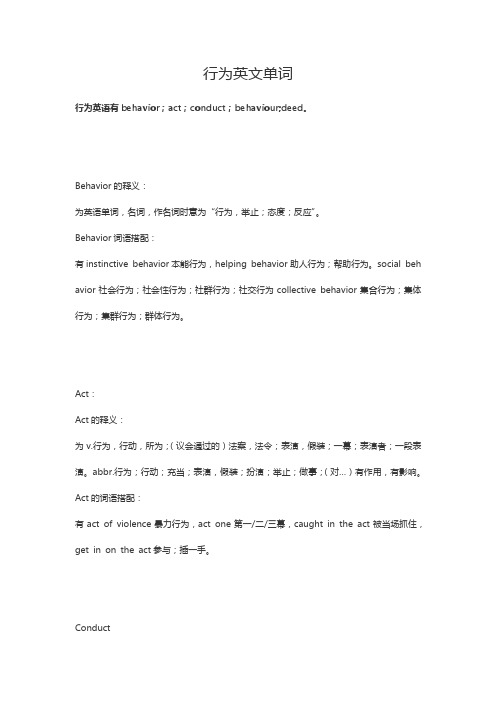
行为英文单词行为英语有behavior;act;conduct;behaviour;deed。
Behavior的释义:为英语单词,名词,作名词时意为“行为,举止;态度;反应”。
Behavior词语搭配:有instinctive behavior本能行为,helping behavior助人行为;帮助行为。
social beh avior社会行为;社会性行为;社群行为;社交行为collective behavior集合行为;集体行为;集群行为;群体行为。
Act:Act的释义:为v.行为,行动,所为;(议会通过的)法案,法令;表演,假装;一幕;表演者;一段表演。
abbr.行为;行动;充当;表演,假装;扮演;举止;做事;(对…)有作用,有影响。
Act的词语搭配:有act of violence暴力行为,act one第一/二/三幕,caught in the act被当场抓住,get in on the act参与;插一手。
ConductConduct的释义:英语单词,拥有动词 (v)、名词 (n)两种词性。
v.组织;安排;实施;执行,指挥 (歌唱或音乐演奏);n. (人在某地或某种情况下的)行为,举止,经营方式;管理办法;实施方法。
Conduct的词语搭配:illegal conduct非法行为;违法行为;不正当行为,soul Conduct灵魂的指挥家,right conduct正当的行为;正当行为,abusive conduct滥用行为。
BehaviourBehaviour的释义:behaviour是一个英语名词,意思是行为,举止,品行,表现。
作用,反应举动,行动,习性,特性,性能。
Behaviour的词语搭配:learned behaviour习得行为,human behaviour人类行为,behaviour problems行为问题,behaviour pattern行为模式。
Deed:Deed的释义:Deed是英文单词,名词 (n.)、动词 (v.)。
30个常见的形容词英语描写人

30个常见的形容词英语描写人30 Common Adjectives to Describe People in English.Describing people in English can be an interesting and challenging task. Adjectives play a crucial role inpainting a vivid picture of a person's appearance, personality, or characteristics. Here are 30 common adjectives that can help you describe people effectively in English:1. Handsome: Used to describe a man who is attractivein appearance.Example: He is a very handsome man with a strong jawline and charming smile.2. Beautiful: Used to describe a woman or anything that is visually appealing.Example: She is beautiful with her long, curly hairand sparkling eyes.3. Talented: Describes someone who has special skills or abilities.Example: He is a talented musician who can play several instruments.4. Intelligent: Describes someone who is clever and hasa high IQ.Example: She is an intelligent woman who alwaysfinds innovative solutions to problems.5. Friendly: Describes someone who is kind and easy to get along with.Example: He is a friendly person who always greets his neighbors with a smile.6. Outgoing: Describes someone who is extroverted and enjoys socializing.Example: She is an outgoing person who loves to attend parties and meet new people.7. Shy: Describes someone who is reserved and tends to be uncomfortable in social settings.Example: He is a shy boy who finds it difficult to speak in public.8. Patient: Describes someone who has a calm temperament and is willing to wait or endure.Example: She is a patient teacher who never loses her temper with her students.9. Ambitious: Describes someone who is driven and determined to succeed.Example: He is an ambitious entrepreneur who always has big plans for his business.10. Loyal: Describes someone who is faithful and trustworthy.Example: She is a loyal friend who would never betray her best friend's trust.11. Funny: Describes someone who has a good sense of humor and can make people laugh.Example: He is a funny guy who always knows how to break the ice with a joke.12. Serious: Describes someone who is solemn and takes life seriously.Example: She is a serious student who always completes her homework on time.13. Creative: Describes someone who is imaginative and can create original works.Example: He is a creative artist who creates uniquepaintings that captivate his audience.14. Confident: Describes someone who is sure of themselves and their abilities.Example: She is a confident speaker who never hesitates to voice her opinions.15. Optimistic: Describes someone who is hopeful and expects positive outcomes.Example: He is an optimistic person who always sees the bright side of life.16. Pessimistic: Describes someone who tends to be negative and see the worst in situations.Example: She is a pessimistic person who always expects the worst to happen.17. Brave: Describes someone who is courageous and not afraid to take risks.Example: He is a brave soldier who is not afraid to face danger.18. Generous: Describes someone who is kind and willing to share their wealth or possessions.Example: She is a generous person who always donates to charity.19. Stubborn: Describes someone who is resistant to change and holds onto their opinions stubbornly.Example: He is a stubborn man who refuses to listen to anyone else's opinion.20. Flexible: Describes someone who is adaptable and can easily change their plans or: opinions Describes. someone who is self-。
行为动词英语词汇大全
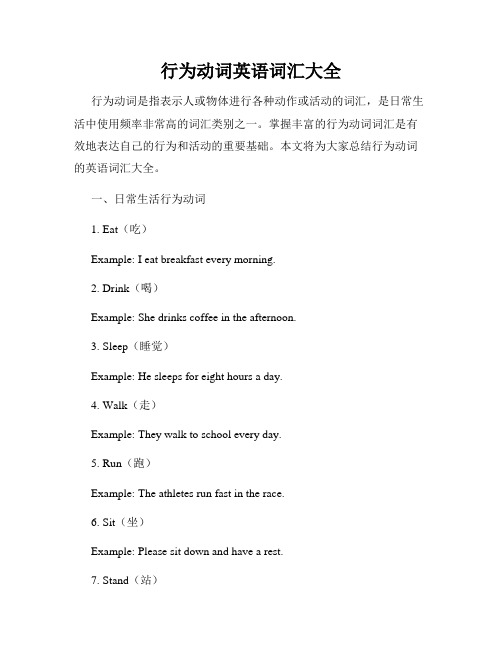
行为动词英语词汇大全行为动词是指表示人或物体进行各种动作或活动的词汇,是日常生活中使用频率非常高的词汇类别之一。
掌握丰富的行为动词词汇是有效地表达自己的行为和活动的重要基础。
本文将为大家总结行为动词的英语词汇大全。
一、日常生活行为动词1. Eat(吃)Example: I eat breakfast every morning.2. Drink(喝)Example: She drinks coffee in the afternoon.3. Sleep(睡觉)Example: He sleeps for eight hours a day.4. Walk(走)Example: They walk to school every day.5. Run(跑)Example: The athletes run fast in the race.6. Sit(坐)Example: Please sit down and have a rest.7. Stand(站)Example: The teacher stands in front of the class.8. Talk(说话)Example: They talk about their weekend plans.9. Listen(听)Example: I like to listen to music in my free time.10. Read(读)Example: She reads a book before bedtime.二、社交行为动词1. Talk(交谈)Example: They talk about their interests during the dinner.2. Chat(聊天)Example: We chat online every night.3. Meet(见面)Example: Let's meet at the coffee shop tomorrow.4. Greet(问候)Example: I greeted him with a smile.5. Invite(邀请)Example: She invited me to her birthday party.6. Apologize(道歉)Example: He apologized for his mistake.7. Thank(感谢)Example: We thanked them for their help.8. Congratulate(祝贺)Example: I congratulated her on her success.9. Hug(拥抱)Example: They hugged each other tightly.10. Shake hands(握手)Example: They shook hands to show their friendship.三、体育活动行为动词1. Play(打)Example: They play basketball after school.2. Swim(游泳)Example: She swims in the pool every weekend.3. Dance(跳舞)Example: We danced at the party last night.4. Ski(滑雪)Example: He skis in the mountains during winter.5. Climb(攀爬)Example: They climb the mountain every summer.6. Jump(跳跃)Example: The kids jumped on the trampoline.7. Kick(踢)Example: He kicked the ball into the goal.8. Throw(扔)Example: She throws the ball to her friend.9. Catch(接住)Example: He caught the flying disc in the air. 10. Run(跑)Example: They run a marathon every year.四、工作行为动词1. Work(工作)Example: He works as a doctor in a hospital.2. Study(学习)Example: She studies English at the library.3. Teach(教)Example: The teacher teaches math in the classroom.4. Write(写)Example: They write reports for their boss.5. Type(打字)Example: She types documents on the computer.6. Present(演讲)Example: He presents his research findings to the audience.7. Design(设计)Example: They design buildings for a living.8. Build(建造)Example: The workers build houses for the residents.9. Fix(修理)Example: He fixes the broken computer.10. Serve(服务)Example: The waitress serves the customers in the restaurant.五、情感行为动词1. Love(爱)Example: They love each other deeply.2. Hate(讨厌)Example: He hates spiders.3. Like(喜欢)Example: She likes to eat pizza.4. Dislike(不喜欢)Example: They dislike the taste of durian.5. Enjoy(喜爱)Example: We enjoy watching movies in the cinema.6. Appreciate(欣赏)Example: He appreciates the beauty of nature.7. Miss(思念)Example: She misses her family when she's away.8. Fear(害怕)Example: They fear heights.9. Trust(信任)Example: He trusts his best friend completely. 10. Feel(感觉)Example: They feel happy after a good workout.通过学习并掌握这些行为动词的英语词汇,您将能够更准确地描述您的行为和活动,提升您的英语交流能力。
30种肢体语言英语七年级
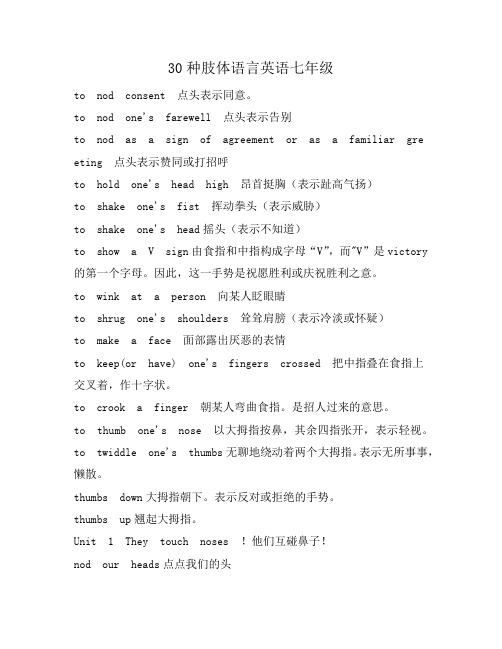
30种肢体语言英语七年级to nod consent 点头表示同意。
to nod one's farewell 点头表示告别to nod as a sign of agreement or as a familiar gre eting 点头表示赞同或打招呼to hold one's head high 昂首挺胸(表示趾高气扬)to shake one's fist 挥动拳头(表示威胁)to shake one's head摇头(表示不知道)to show a V sign由食指和中指构成字母“V”,而"V”是victory 的第一个字母。
因此,这一手势是祝愿胜利或庆祝胜利之意。
to wink at a person 向某人眨眼睛to shrug one's shoulders 耸耸肩膀(表示冷淡或怀疑)to make a face 面部露出厌恶的表情to keep(or have) one's fingers crossed 把中指叠在食指上交叉着,作十字状。
to crook a finger 朝某人弯曲食指。
是招人过来的意思。
to thumb one's nose 以大拇指按鼻,其余四指张开,表示轻视。
to twiddle one's thumbs无聊地绕动着两个大拇指。
表示无所事事,懒散。
thumbs down大拇指朝下。
表示反对或拒绝的手势。
thumbs up翘起大拇指。
Unit 1 They touch noses !他们互碰鼻子!nod our heads点点我们的头shake hands and smile 握手和微笑shake hands 握手some kiss 一些亲吻hug each other相互拥抱put their hands together把他们手放在一起Howclose 多靠近arm in arm手臂挽着手臂move away! 离开,挪开/移开look at 看着..look at each other彼此相互看着对方hold your arm握住你的手臂wave to say goodbye 挥手说再见。
英文资料(礼貌行为举止)
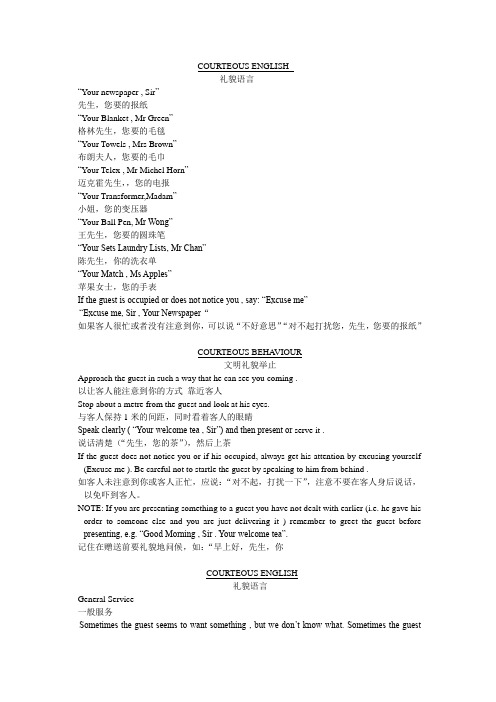
COURTEOUS ENGLISH礼貌语言-“Your newspaper , Sir”-先生,您要的报纸-“Your Blanket , Mr Green”-格林先生,您要的毛毯-“Your Towels , Mrs Brown”-布朗夫人,您要的毛巾-“Your Telex , Mr Michel Horn”-迈克霍先生,,您的电报-“Your Transformer,Madam”-小姐,您的变压器-“Your Ball Pen, Mr Wong”-王先生,您要的圆珠笔-“Your Sets Laundry Lists, Mr Chan”-陈先生,你的洗衣单-“Your Match , Ms Apples”-苹果女士,您的手表-If the guest is occupied or does not notice you , say: “Excuse me”“Excuse me, Sir , Your Newspaper“-如果客人很忙或者没有注意到你,可以说“不好意思”“对不起打扰您,先生,您要的报纸”COURTEOUS BEHA VIOUR文明礼貌举止-Approach the guest in such a way that he can see you coming .-以让客人能注意到你的方式靠近客人-Stop about a metre from the guest and look at his eyes.-与客人保持1米的间距,同时看着客人的眼睛-Speak clearly ( “Your welcome tea , Sir”) and then present or serve it .-说话清楚(“先生,您的茶”),然后上茶-If the guest does not notice you or if his occupied, always get his attention by excusing yourself (Excuse me ). Be careful not to startle the guest by speaking to him from behind .-如客人未注意到你或客人正忙,应说:“对不起,打扰一下”,注意不要在客人身后说话,以免吓到客人。
英美人士的肢体语言英语百科知识
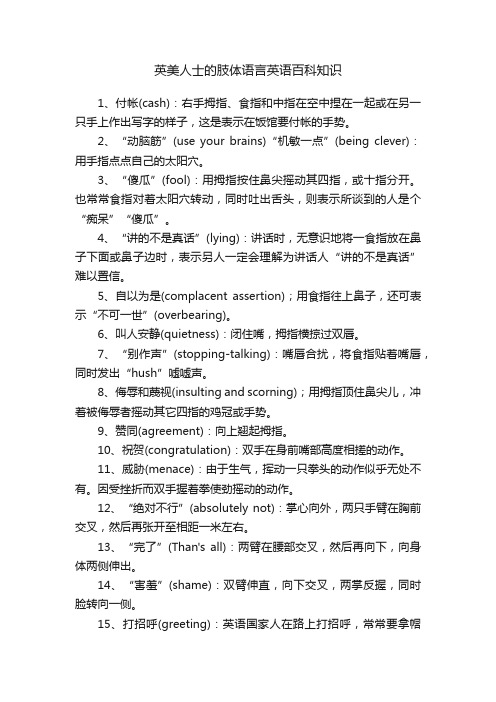
英美人士的肢体语言英语百科知识1、付帐(cash):右手拇指、食指和中指在空中捏在一起或在另一只手上作出写字的样子,这是表示在饭馆要付帐的手势。
2、“动脑筋”(use your brains)“机敏一点”(being clever):用手指点点自己的太阳穴。
3、“傻瓜”(fool):用拇指按住鼻尖摇动其四指,或十指分开。
也常常食指对着太阳穴转动,同时吐出舌头,则表示所谈到的人是个“痴呆”“傻瓜”。
4、“讲的不是真话”(lying):讲话时,无意识地将一食指放在鼻子下面或鼻子边时,表示另人一定会理解为讲话人“讲的不是真话”难以置信。
5、自以为是(complacent assertion);用食指往上鼻子,还可表示“不可一世”(overbearing)。
6、叫人安静(quietness):闭住嘴,拇指横掠过双唇。
7、“别作声”(stopping-talking):嘴唇合扰,将食指贴着嘴唇,同时发出“hush”嘘嘘声。
8、侮辱和蔑视(insulting and scorning);用拇指顶住鼻尖儿,冲着被侮辱者摇动其它四指的鸡冠或手势。
9、赞同(agreement):向上翘起拇指。
10、祝贺(congratulation):双手在身前嘴部高度相搓的动作。
11、威胁(menace):由于生气,挥动一只拳头的动作似乎无处不有。
因受挫折而双手握着拳使劲摇动的动作。
12、“绝对不行”(absolutely not):掌心向外,两只手臂在胸前交叉,然后再张开至相距一米左右。
13、“完了”(Than's all):两臂在腰部交叉,然后再向下,向身体两侧伸出。
14、“害羞”(shame):双臂伸直,向下交叉,两掌反握,同时脸转向一侧。
15、打招呼(greeting):英语国家人在路上打招呼,常常要拿帽子表示致意。
现一般已化为抬一下帽子,甚至只是摸一下帽沿。
16、高兴激动(happiness and excitedness):双手握拳向上举起,前后频频用力摇动。
在口语中描述人物特征的词汇
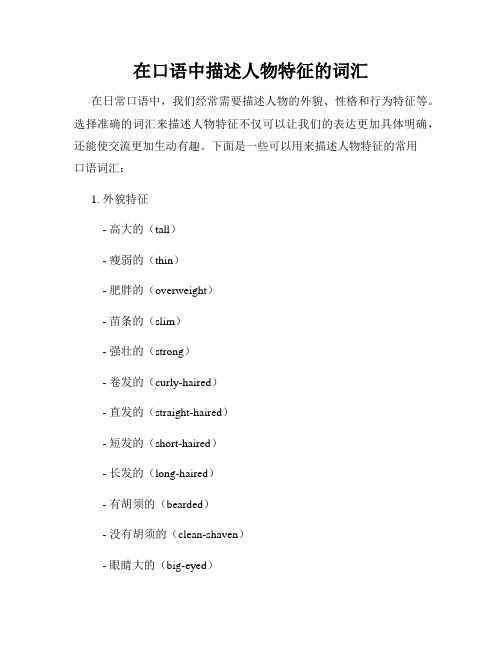
在口语中描述人物特征的词汇在日常口语中,我们经常需要描述人物的外貌、性格和行为特征等。
选择准确的词汇来描述人物特征不仅可以让我们的表达更加具体明确,还能使交流更加生动有趣。
下面是一些可以用来描述人物特征的常用口语词汇:1. 外貌特征- 高大的(tall)- 瘦弱的(thin)- 肥胖的(overweight)- 苗条的(slim)- 强壮的(strong)- 卷发的(curly-haired)- 直发的(straight-haired)- 短发的(short-haired)- 长发的(long-haired)- 有胡须的(bearded)- 没有胡须的(clean-shaven)- 眼睛大的(big-eyed)- 眼睛小的(small-eyed)- 肤色黝黑的(dark-skinned)- 肤色白皙的(fair-skinned)- 神情慈祥的(kind-looking)- 神情严肃的(serious-looking) - 神情疲惫的(tired-looking)- 神情自信的(confident-looking)2. 性格特征- 友好的(friendly)- 开朗的(outgoing)- 内向的(introverted)- 幽默的(humorous)- 耐心的(patient)- 勇敢的(brave)- 细心的(attentive)- 害羞的(shy)- 乐观的(optimistic)- 悲观的(pessimistic)- 善良的(kind)- 懒散的(lazy)- 冲动的(impulsive)- 腼腆的(timid)- 独立的(independent)- 好奇的(curious)- 忠诚的(loyal)3. 行为特征- 爱笑的(smiling)- 爱说话的(talkative)- 勤奋的(hardworking)- 多愁善感的(sensitive)- 冷漠的(indifferent)- 冲动的(impulsive)- 严肃的(serious)- 追求新鲜感的(adventurous)- 懒散的(lazy)- 悲观的(pessimistic)- 乐观的(optimistic)- 健谈的(chatty)- 善良的(kind)- 敏感的(sensitive)- 高效的(efficient)这些词汇能够帮助我们更加准确地描述人物的外貌、性格和行为特征。
英语中的肢体语言
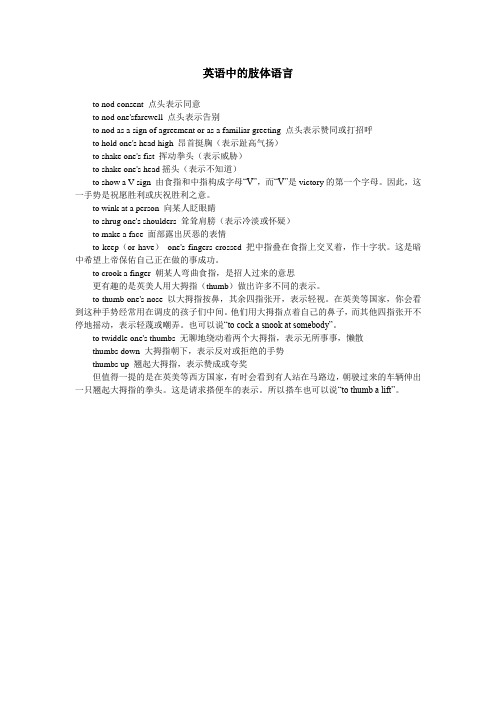
英语中的肢体语言to nod consent 点头表示同意to nod one'sfarewell 点头表示告别to nod as a sign of agreement or as a familiar greeting 点头表示赞同或打招呼to hold one's head high 昂首挺胸(表示趾高气扬)to shake one's fist 挥动拳头(表示威胁)to shake one's head摇头(表示不知道)to show a V sign 由食指和中指构成字母“V”,而“V”是victory的第一个字母。
因此,这一手势是祝愿胜利或庆祝胜利之意。
to wink at a person 向某人眨眼睛to shrug one's shoulders 耸耸肩膀(表示冷淡或怀疑)to make a face 面部露出厌恶的表情to keep(or have)one's fingers crossed 把中指叠在食指上交叉着,作十字状。
这是暗中希望上帝保佑自己正在做的事成功。
to crook a finger 朝某人弯曲食指,是招人过来的意思更有趣的是英美人用大拇指(thumb)做出许多不同的表示。
to thumb one's nose 以大拇指按鼻,其余四指张开,表示轻视。
在英美等国家,你会看到这种手势经常用在调皮的孩子们中间。
他们用大拇指点着自己的鼻子,而其他四指张开不停地摇动,表示轻蔑或嘲弄。
也可以说“to cock a snook at somebody”。
to twiddle one's thumbs 无聊地绕动着两个大拇指,表示无所事事,懒散thumbs down 大拇指朝下,表示反对或拒绝的手势thumbs up 翘起大拇指,表示赞成或夸奖但值得一提的是在英美等西方国家,有时会看到有人站在马路边,朝驶过来的车辆伸出一只翘起大拇指的拳头。
- 1、下载文档前请自行甄别文档内容的完整性,平台不提供额外的编辑、内容补充、找答案等附加服务。
- 2、"仅部分预览"的文档,不可在线预览部分如存在完整性等问题,可反馈申请退款(可完整预览的文档不适用该条件!)。
- 3、如文档侵犯您的权益,请联系客服反馈,我们会尽快为您处理(人工客服工作时间:9:00-18:30)。
List of Words that Describe Behavior一些描写人的行为举止的英文词汇Many things can affect(影响)behavior:∙Your mood 你的情绪∙The people that you are around∙Things that happen to youStress(压力)and your physical condition(身体状况)also have a bearing on(影响)your behavior. We are going to look at good, socially accepted behavior(被社会接受的行为)and bad or out of control(失控的)behavior.以下是人物描写中,积极正面的形容词Caring: desire to help people 有同情心的∙Charming: pleasant, delightful 富有魅力的;讨人喜爱的∙Considerate: thinking of others 体贴周到的∙Enthusiastic[inˌθju:ziˈæstik]: has strong feelings; ardent 狂热的∙Excitable: gets excited easily 容易激动的∙Faithful: being loyal 虔诚的∙Funny: causing people to laugh∙Kind: thoughtful, caring 好心的∙Pleasant: polite 令人愉快的;∙Polite: exhibiting good manners 有礼貌,有教养的∙Sincere[sinˈsiə]: being totally honest 真诚的∙Thoughtful: thinking things over 体贴入微的∙Other words: adaptable(有适应能力的), brave, confident(自信), cooperative(合作的), courageous(勇敢), debonair((通常指男人)愉快而自信的), decisive(果断的), determined(坚定的), generous(慷慨的), hilarious(引人捧腹大笑的), honorable(可敬的), lively(活泼的), pleasant(令人愉快的), productive(多产的), protective(呵护的), receptive(善于接受的), reflective(深思的), responsible(尽责的), romantic(浪漫的), self-assured(自信的), sensitive(敏感的), shrewd(精明的), unusual(与众不同的), witty(诙谐机智的), wonderful, zany(滑稽的), and zealous(激情四射的).:以下则是人物描写中,消极负面的形容词∙Aggressive: verbally or physically threatening 好斗的∙Argumentative: often arguing with people 好辩的∙Bossy: always telling people what to do 爱发号施令的∙Deceitful: doing or saying anything to get people to do what you want or to get what you want 不诚实的∙Domineering[ˌdɔməˈnɪərɪŋ]: constantly trying to control others刚愎自用、喜欢支配别人的;专横跋扈∙Inconsiderate: not caring about others or their feelings不体谅别人的∙Irritating[ˈɪrɪˌteɪtɪŋ]: bothering people 气人的,使人不愉快的∙Manic: acting just a little crazy 狂躁的∙Manipulative[məˈnɪpjələtɪv]: always trying to influences other people工于心计的∙Moody: being unpredictable; changing moods often 情绪化的∙Rude: treating people badly; breaking social rules 粗鲁的∙Spiteful: seeking revenge; hurting others because you di dn’t get what you want 怀有恶意的∙Thoughtless: not thinking about the effects of your actions or words不顾及他人的;欠考虑的∙Other words: abrasive(生硬粗暴), abusive(残酷暴虐), angry, anxious, belligerent(好斗的), boorish(无教养的), cowardly(怯懦的), crazy, creepy(鬼鬼祟祟), cruel(残忍的), dangerous, defiant(桀骜不驯), erratic(反复无常), finicky(吹毛求疵), flashy(花里胡哨的), flippant(轻浮的), foolish, furtive(贼头鼠脑), guarded(充满戒备), jittery(惶恐不安), malicious(恶意的), mysterious(故弄玄虚的), obnoxious(可憎的), outrageous(无法容忍的), panicky(恐慌的), secretive(遮遮掩掩), strange(怪异), threatening(恐吓的), unsuitable(不相称的), vengeful(报复心重), and wary(谨小慎微的).Words That Describe Personal BehaviorThe following words describe behavior that is more personal in nature. The behavior is not affected very much by the company or situation.∙Active: always busy with something积极的∙Ambitious: strongly wants to succeed 雄心勃勃的∙Assertive[əˈsɜ:tɪv]: being outgoing and confident武断的,坚毅的∙Careless: not being careful; rushing into things粗心大意的∙Cautious[ˈkɔ:ʃəs]: being very careful 小心谨慎的∙Conceited[kənˈsi:tɪd]: thinks he is better than others; arrogant 骄傲自大的∙Conscientious: taking time to do things right 深思熟虑的∙Creative: someone who can make up things easily or think of new things 有创造性的∙Curious: always wanting to know things好奇的∙Docile[ˈdɔsəl]: submissive, does what he is told温顺的∙Extroverted[ˈekstrəvə:tid]: very outgoing; confident外向性的,喜社交的∙Impulsive: saying or doing things without thinking first 好冲动的∙Introverted[ˈintrəvə:tid]: keeps to himself, doesn’t share thoughts and feelings内向的∙Inventive: thinks of new ideas 富有创造性的∙nervous: very uncomfortable 神经质的∙Passive: does not argue; does as he is told被动的;消极的∙Perfectionist[pəˈfekʃɵnɪst]: wants everything to be done right and perfectly完美主义者;吹毛求疵者∙Pragmatic[prægˈmætɪk] always sees the practical side of things实用主义的;好管闲事的∙Reserved: keeps thoughts and feelings to himself 矜持的∙Serious: no-nonsense kind of behavior 严肃的∙Shy: quite and reserved; lacking in confidence 害羞的∙Trustworthy: simply worthy of someone’s trust 值得信赖的∙V olatile[ˈvɔlətail]: changing moods very quickly反复无常的Of course there are many more words that can describe the way someone is acting. Behavior changes as we get older, too, as priorities change and we gain wisdom. Hopefully the words that you are looking for were included on these lists.Author: Christy Rakoczy。
